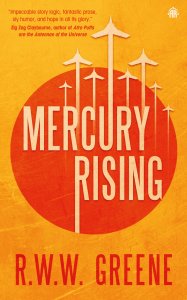Paul Di Filippo Reviews Mercury Rising by R.W.W. Greene
 Mercury Rising, R.W.W. Greene (Angry Robot 978-0857669728, trade paperback, 400pp, $15.99) May 2022.
Mercury Rising, R.W.W. Greene (Angry Robot 978-0857669728, trade paperback, 400pp, $15.99) May 2022.
Greene’s third novel is, overarchingly, a counterfactual tale of what happens in the several decades after the year 1961, when Earth is threatened by invaders from Mercury. But that over-simplified description ignores a host of other themes and virtues and plot contrivances which render the book a jam-packed action-adventure tale centered around a lovable anti-hero. The novel exhibits the gonzo brio of a Rudy Rucker book or classic Norman Spinrad, along with some alternate world-building that Harry Turtledove might envy.
We start out with a prologue of a couple of thousand words that is a trifle misleading as to what the rest of the book will be. Our hero in this section is one Jet Carson, a rocket jockey in the USA’s journeyman space force, used to routine action like ferrying stuff up to Eisenhower Station in orbit. (You can see that this continuum has diverged from ours even before the arrival of aliens.) Jet has counterparts among the Russkies as well. One crucial day Jet receives orders to take his squadron into orbit and rendezvous with some rival Russians. There the astronauts of both nations learn of the impending Mercurian invasion—a single large ship with lots of little scouts. Their mission is to stop the invaders before they can do more damage—they have already wiped out a couple of Earth cities, but the news was suppressed. Off Jet flies, on what will prove to be, alas, a suicide mission.
This section is presented in parodic tones, like something drafted by Sheckley or Harry Harrison, and the reader might suspect that the rest of the book will continue to be a broad-stroke comedy as well. But instead we learn that we have been witnessing the trumped-up Hollywood version of Jet Carson’s story, and the remainder of the book will instead convey the nitty-gritty reality of Greene’s scenario.
We jump ahead to 1975, and meet our real protagonist, Brooklyn Lamontagne, a young guy who is pretty much an antisocial layabout and mook (though he does love and honor his Mom), subsisting on minor criminal ventures. His social circle is vividly fleshed out with plenty of colorful characters, and the whole global scene—everyone just awaiting the Damoclean Sword of alien invasion that was earlier forestalled—is conveyed sharply. There’s almost a kind of John Dos Passos naturalism to this section. For these inhabitants of 1975, life goes on. The Rolling Stones have a new release and that matters more than some jokers from space. (The book is filled with clever and apt musical references—some dovetailing with our history, some at odds—and the book gains a kind of Tom Robbins/Richard Brautigan feel thereby.)
One of Brooklyn’s capers goes awry, he ends up in prison facing serious time, and then is given the chance to enlist in the Earth Defense Force. He agrees to the offer, and now we follow him through his boot camp, some unexpected heroism, his first assignments, some combat time and then—well, Greene throws a big curveball I shan’t reveal, which puts Brooklyn in a very weird venue and blows up all the assumptions and certified knowledge that humanity had. Oh, and I might not have mentioned that Brooklyn gets injected with alien tech, rendering him somewhat superhuman, and also acquires a green-skinned Amazonian girlfriend. The tale’s ending is quite satisfying and closure-laden, circling back in fact to Jet Carson, but nonetheless, behold: our publisher informs us happily that a sequel is due in 2023, Earth Retrograde. A very welcome prospect.
Greene’s tone and his presentation of Brooklyn’s life harks a little bit to the cybernoir of Richard Morgan. But Greene also displays a humanistic, almost hippish aura, perfectly consistent with the 1970s milieu. The best example of this occurs starting in Chapter Thirteen where Brooklyn, on leave, goes to visit the Cleveland Crater, which proves to be the scene of a perpetual Woodstock-cum-Grateful-Dead happening. It’s a meditative, bucolic moment amidst all the wild action which conveys the reality of this world forcefully.
He sipped beer and chatted with Holly while the rim of the crater slowly filled with hippies and robes-and-cults types. Peddlers worked the crowd, selling drugs and craft items, soda pop, beer, bootleg eight-tracks, and cheap souvenirs. Women in tie-dyed skirts danced to pipe-and-drum music.
When Brooklyn gets installed in that very weird venue to which I alluded, along with some other abducted humans and a host of aliens, the book assumes a bit of an enjoyable John Varley heft. But I hope that with my references to a passel of other authors as role models, I am not eliding Greene’s organic unique wholeness. He has a distinctive voice and worldview, rich with speculative and narrative chops, and this tale achieves that fictional desideratum of instantiating a world that never existed, which is nonetheless alluring enough that we can imagine living there, albeit not happily ever after.
 While you are here, please take a moment to support Locus with a one-time or recurring donation. We rely on reader donations to keep the magazine and site going, and would like to keep the site paywall free, but WE NEED YOUR FINANCIAL SUPPORT to continue quality coverage of the science fiction and fantasy field.
While you are here, please take a moment to support Locus with a one-time or recurring donation. We rely on reader donations to keep the magazine and site going, and would like to keep the site paywall free, but WE NEED YOUR FINANCIAL SUPPORT to continue quality coverage of the science fiction and fantasy field.
©Locus Magazine. Copyrighted material may not be republished without permission of LSFF.








Thanks so much for taking the time to read and to write the review. I’m happy you picked up what I was trying to put down!